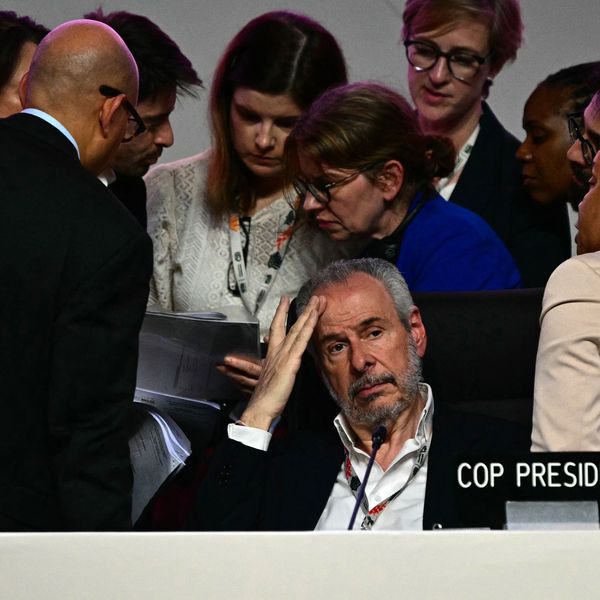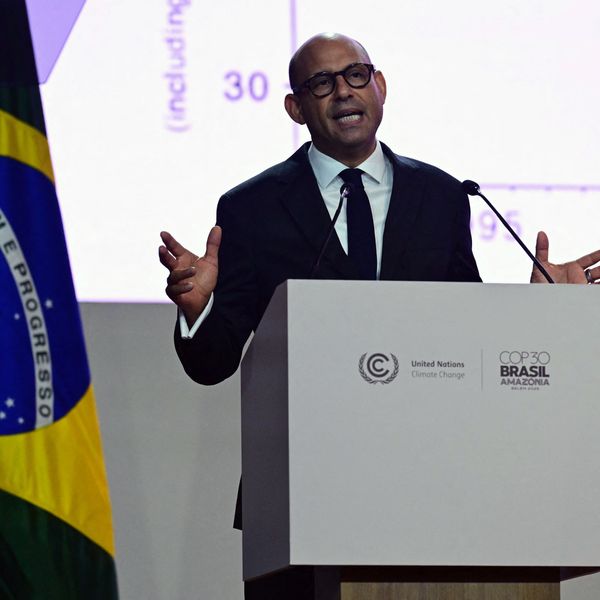US Balks at Bali Carbon Targets
The UN climate talks seeking a new pact on global warming hit a potential problem today when the US said it was unwilling to approve a draft agreement setting firm targets for cuts to carbon pollution.The US said a proposal for developed nations to reduce emissions by 25-40% by 2020, which is backed by Britain and the EU, was "totally unrealistic" and "unhelpful". Other nations, including Japan, are believed to be against the idea.
The US said it was in Bali to be "constructive" and wanted the meeting to agree a roadmap to a new agreement, which would be concluded by 2009. But it said it would not agree a firm target, presented either as an emissions reduction or as a maximum temperature rise.
European negotiators argue such a target is needed to reflect the urgency of the problem and to encourage industry to invest in green technology.
In an unusual step, the UN published the text of the four-page draft agreement, based on the first week of informal discussions, on its website over the weekend. It will now be argued over by the 190 countries present.
Observers said the draft would be repeatedly modified and updated through the week. A final version must be agreed by Friday.
The initial draft calls on countries to respond to the "unequivocal scientific evidence that preventing the worst effects of climate change will require [developed nations] to reduce emissions in a range of 25-40% below 1990 levels by 2020 and that global emissions of greenhouse gases need to peak in the next 10 to 15 years".
Harlan Watson, the senior climate negotiator for the US, said: "We have problems with defining the numbers up front. In our view that pre-judges the outcome of the negotiations over the next two years."
He said the US supported the concept of a "shared global goal" to address climate change but did not want the Bali meeting to discuss exact numbers.
The 25-40% figure is based on the work of the UN's Intergovernmental Panel on Climate Change, due to be formally awarded the Nobel peace prize jointly with Al Gore today. Watson said the IPCC calculation was based on "many uncertainties".
Yvo de Boer, the head of the UN climate secretariat, said the 25-40% figure would be a "critical issue" at the talks. He said it was an important signpost to show where the world was heading in dealing with global warming.
(c) 2007 The Guardian
An Urgent Message From Our Co-Founder
Dear Common Dreams reader, The U.S. is on a fast track to authoritarianism like nothing I've ever seen. Meanwhile, corporate news outlets are utterly capitulating to Trump, twisting their coverage to avoid drawing his ire while lining up to stuff cash in his pockets. That's why I believe that Common Dreams is doing the best and most consequential reporting that we've ever done. Our small but mighty team is a progressive reporting powerhouse, covering the news every day that the corporate media never will. Our mission has always been simple: To inform. To inspire. And to ignite change for the common good. Now here's the key piece that I want all our readers to understand: None of this would be possible without your financial support. That's not just some fundraising cliche. It's the absolute and literal truth. We don't accept corporate advertising and never will. We don't have a paywall because we don't think people should be blocked from critical news based on their ability to pay. Everything we do is funded by the donations of readers like you. Will you donate now to help power the nonprofit, independent reporting of Common Dreams? Thank you for being a vital member of our community. Together, we can keep independent journalism alive when it’s needed most. - Craig Brown, Co-founder |
The UN climate talks seeking a new pact on global warming hit a potential problem today when the US said it was unwilling to approve a draft agreement setting firm targets for cuts to carbon pollution.The US said a proposal for developed nations to reduce emissions by 25-40% by 2020, which is backed by Britain and the EU, was "totally unrealistic" and "unhelpful". Other nations, including Japan, are believed to be against the idea.
The US said it was in Bali to be "constructive" and wanted the meeting to agree a roadmap to a new agreement, which would be concluded by 2009. But it said it would not agree a firm target, presented either as an emissions reduction or as a maximum temperature rise.
European negotiators argue such a target is needed to reflect the urgency of the problem and to encourage industry to invest in green technology.
In an unusual step, the UN published the text of the four-page draft agreement, based on the first week of informal discussions, on its website over the weekend. It will now be argued over by the 190 countries present.
Observers said the draft would be repeatedly modified and updated through the week. A final version must be agreed by Friday.
The initial draft calls on countries to respond to the "unequivocal scientific evidence that preventing the worst effects of climate change will require [developed nations] to reduce emissions in a range of 25-40% below 1990 levels by 2020 and that global emissions of greenhouse gases need to peak in the next 10 to 15 years".
Harlan Watson, the senior climate negotiator for the US, said: "We have problems with defining the numbers up front. In our view that pre-judges the outcome of the negotiations over the next two years."
He said the US supported the concept of a "shared global goal" to address climate change but did not want the Bali meeting to discuss exact numbers.
The 25-40% figure is based on the work of the UN's Intergovernmental Panel on Climate Change, due to be formally awarded the Nobel peace prize jointly with Al Gore today. Watson said the IPCC calculation was based on "many uncertainties".
Yvo de Boer, the head of the UN climate secretariat, said the 25-40% figure would be a "critical issue" at the talks. He said it was an important signpost to show where the world was heading in dealing with global warming.
(c) 2007 The Guardian
The UN climate talks seeking a new pact on global warming hit a potential problem today when the US said it was unwilling to approve a draft agreement setting firm targets for cuts to carbon pollution.The US said a proposal for developed nations to reduce emissions by 25-40% by 2020, which is backed by Britain and the EU, was "totally unrealistic" and "unhelpful". Other nations, including Japan, are believed to be against the idea.
The US said it was in Bali to be "constructive" and wanted the meeting to agree a roadmap to a new agreement, which would be concluded by 2009. But it said it would not agree a firm target, presented either as an emissions reduction or as a maximum temperature rise.
European negotiators argue such a target is needed to reflect the urgency of the problem and to encourage industry to invest in green technology.
In an unusual step, the UN published the text of the four-page draft agreement, based on the first week of informal discussions, on its website over the weekend. It will now be argued over by the 190 countries present.
Observers said the draft would be repeatedly modified and updated through the week. A final version must be agreed by Friday.
The initial draft calls on countries to respond to the "unequivocal scientific evidence that preventing the worst effects of climate change will require [developed nations] to reduce emissions in a range of 25-40% below 1990 levels by 2020 and that global emissions of greenhouse gases need to peak in the next 10 to 15 years".
Harlan Watson, the senior climate negotiator for the US, said: "We have problems with defining the numbers up front. In our view that pre-judges the outcome of the negotiations over the next two years."
He said the US supported the concept of a "shared global goal" to address climate change but did not want the Bali meeting to discuss exact numbers.
The 25-40% figure is based on the work of the UN's Intergovernmental Panel on Climate Change, due to be formally awarded the Nobel peace prize jointly with Al Gore today. Watson said the IPCC calculation was based on "many uncertainties".
Yvo de Boer, the head of the UN climate secretariat, said the 25-40% figure would be a "critical issue" at the talks. He said it was an important signpost to show where the world was heading in dealing with global warming.
(c) 2007 The Guardian

